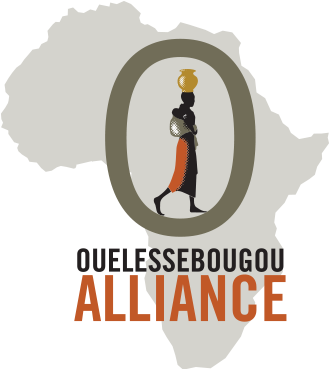New Faraba II Well: Water Saves Lives
Until two months ago, 200 children and 100 adults from the rural village of Faraba II were getting their water from the former gold mining pits to cook their food, wash their clothes, and drink water. Faraba 2 is 30 km from Ouelessebougou and 5 km from Faraba I. It was so hard for this population that some people were not able to give water to their domestic animals such as donkeys, cats, and cows. Additionally, pregnant women had to walk and take their water from these former gold mining pits. The pits are three to four kilometers from their village. In the raining season, the rainy beat them while they had to get their water on the unsafe roads. The thunders are dangerous, and women left their children at home for several hours before they got water.
The stress and illness were so high. The women and children were the most affected by lack of water in Faraba II. Children frequently suffered from diarrhea and stomachaches. Most children were very skinny due to diarrhea and women did not have clean water for cooking and taking pills. The clothes of children, women and men were not clean at all due to the lack of water. Women were exhausted to take water from several miles because they did more work than men in their village.
Ouelessebougou Alliance met with the village leaders to determine the greatest need of the village. During their Healthy Village Workshop training in the winter of 2020, they determined a manual pump well was the best resource to help them achieve their goal to improve water access in their village. A locally vetted plan was devised with the villagers of Faraba II. The Alliance partnered with The Church of the Jesus Christ of Latter-day Saints to construct a new manual pump well for Faraba II. Funding for the well came from LDS Charities West Africa. The villagers of Faraba II contributed as well and will support the maintenance of the well.
Upon completion of the well, the Mali staff witnessed happiness, joy, and gratitude from the people of Faraba 2, particularly the women and children. A mother of six children, Mai Samake, could not control her feelings about this new manual well pump in her village. She said, “You came to help us when were very struggling. It was so difficult to get water in our village. The water in the wells was so bad. We had to take it to survive. We did not have any choice to drink that bad water.”
She continued, “From humans to animals to insects — all were suffering from the water problem. All the wells dried before the harvest time (November) and we spent the half of the year without clean water in our village. This new pump well has been the most important achievement in our village. The people of Faraba II used to take water from also the other neighbor villages such as Tounoufou, which is 4 kilometers from our village and Faraba, which is 5 kilometers from here. Our children, women and donkeys suffered a lot. We used to put so many containers into the donkey carts and bring them to our village. The donkeys worked very hard and we were unable to give them some water that they really need to drink. So bad. So horrific. Sometimes our donkeys could come to the wells for water and they could spend 6 hours without water. A few times, two ladies gave their water to the donkeys and went home with the empty hands. They cried because they felt bad and the donkeys could not say they wanted to water to drink.”
“Anyone that involved in this manual pump well will go to Heaven” says Mai and Awa, mothers in Faraba.
Awa says, “Only God reward the people who financed and built this well in our village. Having this well is changing our lives. We are cooking with clean water; our clothes are going to be clean. If you do not have clean water, you can be always sick. You always wear dirty and bad smell clothes. You are uncomfortable to attend events. This will transform the lives of our families.”


